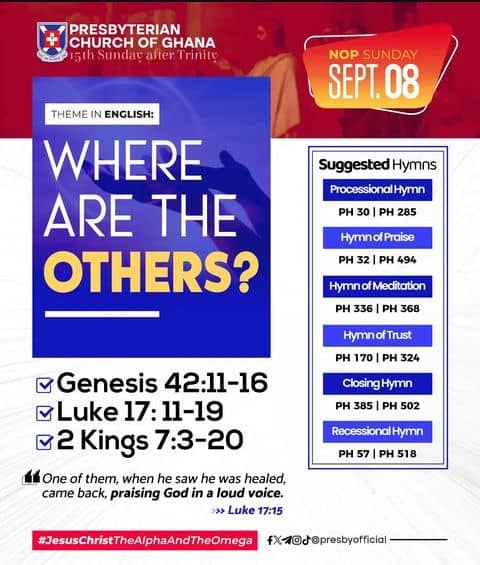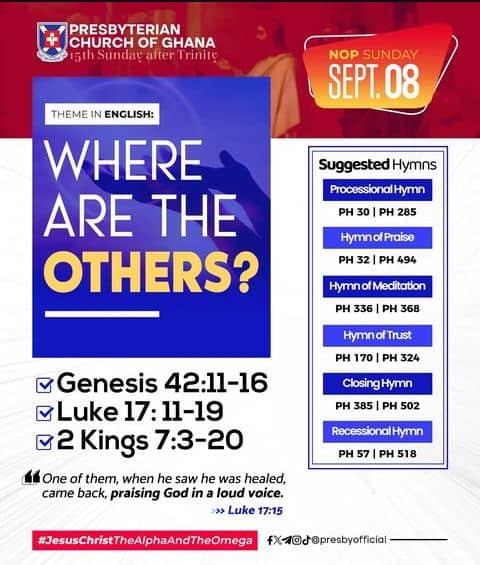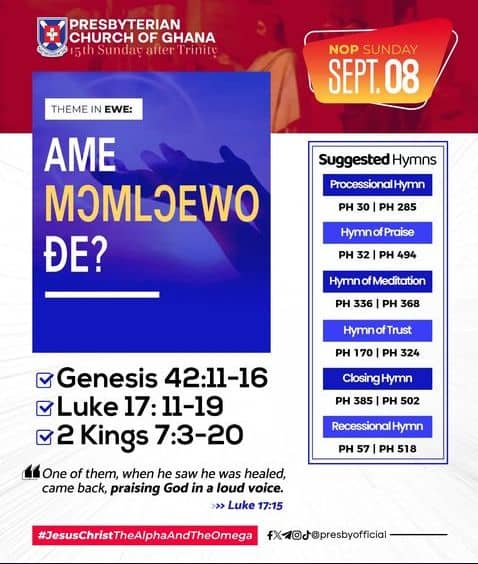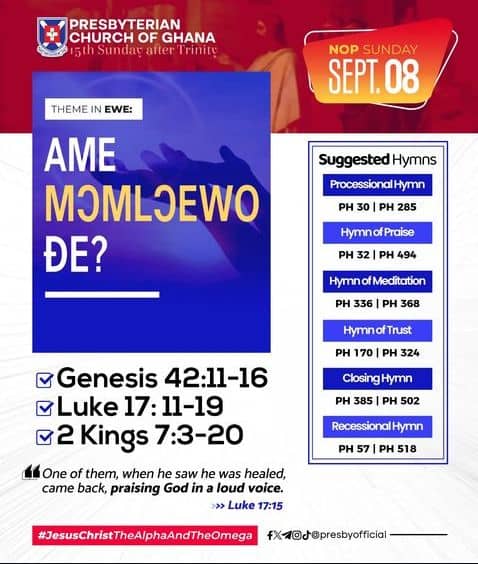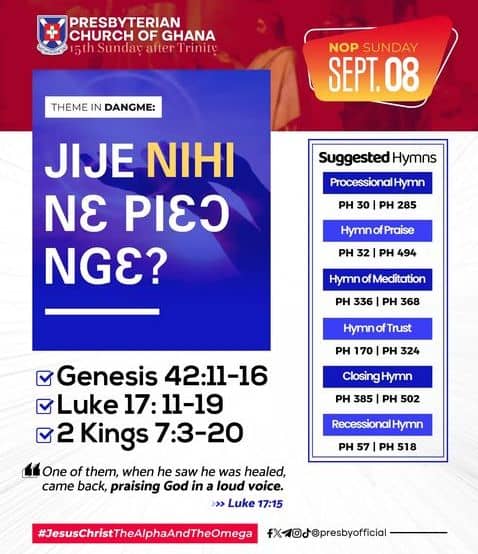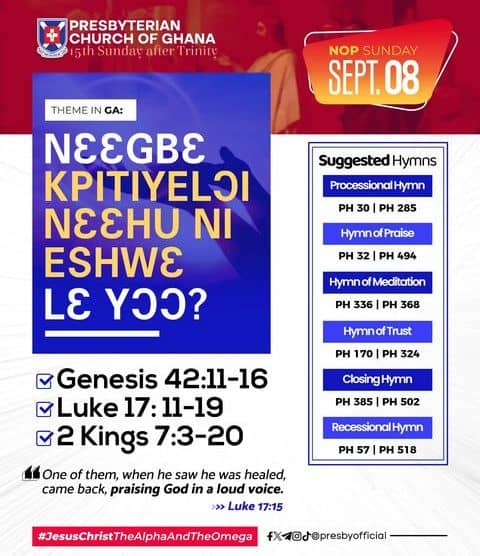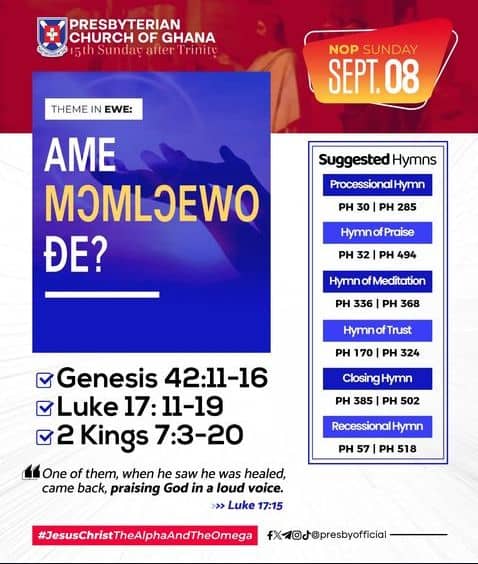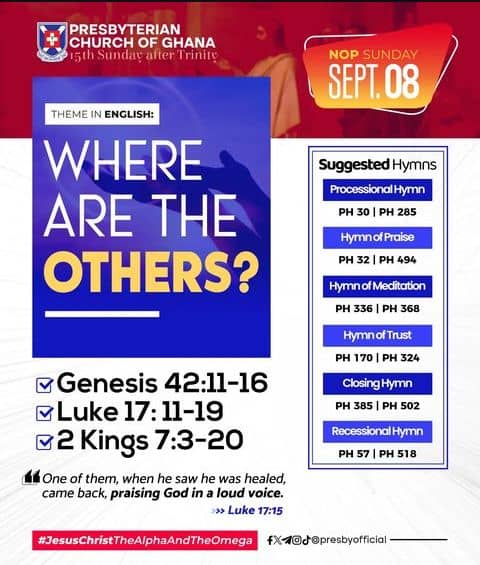 SERMON
ON THE THEME: WHERE ARE THE OTHERS?
SERMON
ON THE THEME: WHERE ARE THE OTHERS?
Scriptural
Texts
1st
Bible Reading: Genesis 42:11-16
2nd
Bible Reading: Luke 17:11-19
3rd
Bible Reading: 2 Kings 7:3-20
Let’s
Pray...
Greet
the one sitting closer to you and welcome him or her to church service today
Imagine
a moment when everything in your life has changed a time when you've received a
blessing or a breakthrough you never expected. You feel the weight of relief,
the joy of deliverance, or the excitement of new possibilities. Now, imagine
looking around and realizing that others who were with you, hoping and waiting
for the same blessing, are nowhere to be found. They received what they asked
for, but they are gone.
Have
you ever wondered, 'Where are the others?' This question is not just for today
it has echoed through time, from the ancient fields of Egypt, to the dusty
roads of Jerusalem, to the gates of Samaria. It's a question that asks us to
look beyond ourselves and to think deeply about those who are missing, those
who have yet to return, and those who are still waiting. It is a question that
can change how we see our faith, our blessings, and our responsibility to one
another. So today, let’s explore this question together: 'Where are the
others?'
INTRODUCTION
We
live in a rapidly changing world, where the pace of life often pulls us in many
directions, making it easy to focus solely on our own needs and challenges.
Yet, as followers of Christ, we are called to look beyond ourselves and ask, "Where
are the others?" This question is not just about those who are
physically absent; it is a question that speaks to the heart of our faith. It
challenges us to think about the people in our lives, our communities, and our
world who are not yet experiencing the fullness of God's grace, mercy, and
love.
In
the Story of Joseph's Brothers: A Lesson in Responsibility and Reconciliation
is what we learn
GENESIS
42:11-16
In
Genesis 42, we find the brothers of Joseph standing before him in Egypt,
unaware that the powerful man they were speaking to was their own brother, whom
they had sold into slavery many years earlier. A severe famine had struck their
homeland, forcing them to come to Egypt to buy grain. Joseph, recognizing his
brothers, puts them to the test, accusing them of being spies and demanding,
"Where are the others?" specifically referring to their youngest
brother, Benjamin.
CONTEXT
AND REFLECTION
Joseph's
question reveals much more than a concern for Benjamin's whereabouts. It
exposes the brothers' past wrongdoings and brings them face to face with their
guilt. For years, they had lived in deceit, hiding their betrayal of Joseph
from their father, Jacob, and from themselves. Now, they are confronted with
their past, and the question "Where are the others?" becomes a call
to accountability and repentance.
As
the Apostle Paul writes in 2 Corinthians 5:18-19, "All this
is from God, who reconciled us to himself through Christ and gave us the
ministry of reconciliation: that God was reconciling the world to himself in
Christ, not counting people's sins against them."
HOW DOES THIS APPLY TO US IN THIS
21ST CENTURY AGE?
How
does this story speak to us today? In our own lives, we often find ourselves in
situations where reconciliation is needed with family members, friends,
colleagues, or within our communities. In a world filled with division,
conflict, and misunderstanding, we are challenged to ask ourselves: "Where
are the others I have left out, hurt, or neglected?" Think about
relationships that might need healing in your life. Are there people you’ve
hurt, consciously or unconsciously, whom you need to reach out to for
reconciliation? Or are there individuals you have been estranged from because
of pride, anger, or misunderstanding?
PRACTICAL
STEPS FOR RECONCILIATION
1.
Pray for guidance to recognize where reconciliation is needed in your
life.
2.
Reach out to those you need to reconcile with a simple call, text, or
visit can be the first step.
3.
Seek forgiveness or offer it with a humble heart, recognizing that
reconciliation is a process that often takes time.
4.
Commit to healing relationships, knowing that God is with you in every
step toward restoration.
With
the story of the Ten Lepers: A Lesson in Gratitude is learnt here
LUKE
17:11-19
In
Luke 17, we encounter Jesus on His way to Jerusalem, passing through a village
where ten lepers cry out for mercy. Jesus responds to their plea and instructs
them to go show themselves to the priests. As they obey, they are miraculously
healed. But only one of them, a Samaritan, returns to Jesus, praising God and
giving thanks. Jesus asks, “Were not all ten cleansed? Where are the other
nine?”
CONTEXT
AND REFLECTION
Jesus'
question, "Where are the others?" is an indictment of ingratitude.
The other nine lepers received physical healing but failed to recognize the
deeper spiritual gift they had received. They took their blessing and continued
on their way, missing an opportunity for a greater encounter with Jesus. The
one who returned was not only healed physically but also received a blessing of
wholeness, as Jesus declared, “Your faith has made you well.”
As
the Psalmist writes in Psalm 100:4-5, "Enter his gates with
thanksgiving and his courts with praise; give thanks to him and bless his name.
For the Lord is good and his love endures forever; his faithfulness continues
through all generations."
HOW
DOES THIS APPLY TO US IN THIS 21ST CENTURY AGE?
In
our modern lives, filled with distractions and pressures, gratitude can often
be overlooked. We are quick to seek God's help in times of trouble but slow to
return to Him with thanksgiving once our prayers are answered. Jesus' question,
“Where are the others?” invites us to examine our own hearts. Are we living
lives marked by gratitude, or are we among the nine who move on without
acknowledging God's goodness?
PRACTICAL
WAYS TO CULTIVATE GRATITUDE
1.
Begin each day with thanksgiving by writing down three things you are
grateful for.
2.
Express gratitude to others regularly whether through words, notes, or
acts of kindness.
3.
Pray with a thankful heart, acknowledging God's goodness even in
difficult times.
4.
Celebrate God's blessings openly, sharing testimonies of His
faithfulness with others.
The
Four Lepers Story: A Lesson in Sharing Blessings is learnt here
2
KINGS 7:3-20
In
2 Kings 7, we read about four lepers who were living outside the gates of
Samaria during a severe famine. Desperate, they decide to go to the enemy's
camp, hoping for mercy. To their surprise, they find the camp deserted,
abandoned by the enemy army who fled in fear, leaving behind food, gold, and
supplies. The lepers initially keep this good news to themselves, but then
realize, "We are not doing right. This is a day of good news, and we are
keeping it to ourselves… Let us go and tell the people."
CONTEXT
AND REFLECTION
The
lepers' realization prompts them to ask, “Where are the others?” They
could have hoarded their discovery, but instead, they chose to share it with
the starving city. Their actions led to the salvation of many lives. This story
illustrates the importance of sharing God's blessings with others, God’s Word
with others, recognizing that what we receive from God is not meant for us
alone.
As
the Apostle Paul writes in Acts 20:35, "In everything I did, I
showed you that by this kind of hard work we must help the weak, remembering
the words the Lord Jesus himself said: 'It is more blessed to give than to
receive.'"
HOW
DOES THIS APPLY TO US IN THIS 21ST CENTURY AGE?
In
today’s world, we are often encouraged to focus on accumulation of wealth,
resources, and even spiritual experiences. Yet, God calls us to a different
path: one of generosity, compassion, and sharing. We are blessed to be a
blessing to others. Are there ways in which we are hoarding the blessings God
has given us? Are there opportunities to share our resources, time, talents,
and love with those in need?
PRACTICAL
WAYS TO SHARE BLESSINGS
1.
Give generously to those in need, whether through your church,
charitable organizations, or directly to individuals.
2.
Volunteer your time and talents in areas where you can make a difference
— tutoring, mentoring, community service, or church activities.
3.
Encourage others with words of kindness, support, and the hope found in
Christ.
4.
Be a witness of God’s love in your workplace, neighborhood, or social
circles, sharing the good news of Jesus whenever the opportunity arises.
CONCLUSION
“Where
are the others?” is a powerful question that compels us to look beyond
ourselves. It is a call to action to seek reconciliation, live in gratitude,
and share our blessings. As we move through our daily lives, may we be mindful
of those around us, asking ourselves, "Where are the others?" and
responding with hearts full of love, compassion, and grace. Let us commit today
to be like Joseph, seeking reconciliation; like the Samaritan leper,
overflowing with gratitude; and like the four lepers, eager to share the good
news. May we never lose sight of the others in our midst who need to experience
God's love through us. May we be the hands and feet of Jesus, bringing His
light into a world in need.
Final
thoughts:
As
we live here for our various homes, work place and other businesses, remember
that the question "Where are the others?" is not just a rhetorical
one, but a call to action. It challenges us to examine our lives, our
relationships, and our communities. It invites us to seek reconciliation, to
live with gratitude, and to share our blessings with others.
In
a world filled with division, strife, and inequality, may we be the ones who
bridge the gaps, who bring people together, and who share the love of Christ
with all. May we be the ones who ask, "Where are the others?" and
then take steps to find them, to serve them, and to love them.
As
the Apostle Paul writes in Galatians 6:2, "Carry each other's
burdens, and in this way you will fulfill the law of Christ." May we carry
the burdens of those around us, may we share their struggles, and may we point
them to the hope and love of Jesus.
In
the end, the question "Where are the others?" is not just
about finding others, but about becoming the kind of people who reflect the
heart of God. May we be those people, and may our lives be a testament to the
power of love, compassion, and grace.
LET
US PRAY…
Dear
Heavenly Father, thank you for challenging us to ask, "Where are the
others?" Help us to seek reconciliation, to live with gratitude, and
to share our blessings with others. Give us eyes to see those around us,
HEARTS TO LOVE THEM, AND HANDS TO SERVE THEM.
May we be your instruments of love and grace in a world in need. In Jesus'
name, we pray. Amen!
BLESSING
May
the Lord bless you and keep you; may the Lord make his face shine upon you and
be gracious to you; may the Lord turn his face toward you and give you peace.
And may you always remember, when you ask, "Where are the others?"
you are not just finding them, but becoming the kind of person who reflects the
heart of God. Go in peace.
